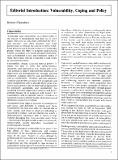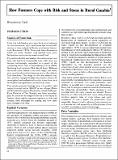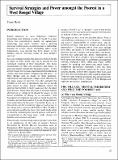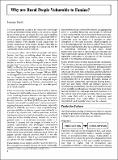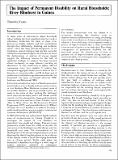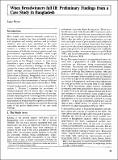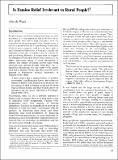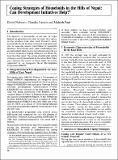Volume 20, Issue 2: Vulnerability: How the Poor Cope
Browse by
Recent Submissions
-
Editorial Introduction: Vulnerability, Coping and Policy
(Institute of Development Studies, 01/04/1989) -
How Farmers Cope with Risk and Stress in Rural Gambia
(Institute of Development Studies, 01/04/1989)SUMMARY With climatic, economic and social changes, poor farm households in The Gambia have tended to become more vulnerable. They face problems of multiple risks, including low, short and uncertain rainfall, price ... -
Survival Strategies and Power amongst the Poorest in a West Bengal Village
(Institute of Development Studies, 01/04/1989)SUMMARY Focusing on ‘people's history’ challenges the assumption that poor people are passive, followers, or apolitical, by identifying ways in which poor people are makers of their own histories. By adapting a ‘people's ... -
Why are Rural People Vulnerable to Famine?
(Institute of Development Studies, 01/04/1989)SUMMARY Vulnerability to famine has been generally explained by reference to failures of production and to failures of exchange, but neither is adequate to explain key aspects of the vulnerability of rural people to famine. ... -
The Impact of Permanent Disability on Rural Households: River Blindness in Guinea
(Institute of Development Studies, 01/04/1989)SUMMARY This article examines the impact of permanent disability on households, based on a 1987 field study in highly endemic areas of onchocerciasis (river blindness) in Guinea (Conakry). Preliminary results are used to ... -
Landless Agricultural Labourers' Asset Strategies
(Institute of Development Studies, 01/04/1989)SUMMARY This examination of the asset strategies of landless agricultural labourers in Coimbatore district, Tamil Nadu, supports the view that it is not so much lack of finance as lack of incentives that limits poor ... -
When Breadwinners fall III: Preliminary Findings from a Case Study in Bangladesh
(Institute of Development Studies, 01/04/1989)SUMMARY This article presents preliminary findings from a study of urban slum households in Khulna, Bangladesh. Chronic incapacitating ill?health among principal household earners, almost all males, was found to have ... -
Is Famine Relief Irrelevant to Rural People?
(Institute of Development Studies, 01/04/1989)SUMMARY This article argues that food relief can be much less relevant to rural people's survival strategies during famine than is generally supposed. Evidence from the 1984/85 famine in Darfur, Sudan suggests that there ... -
Poverty and Sickness: The High Costs of III?Health
(Institute of Development Studies, 01/04/1989)SUMMARY Episodes of sickness have adverse economic consequences at both household and individual level, especially for the poorer. Prolonged or severe sickness imposes strains on the household economy and can jeopardise ... -
Coping Strategies of Households in the Hills of Nepal: Can Development Initiatives Help?
(Institute of Development Studies, 01/04/1989)SUMMARY Subsistence farming households in the hills of Nepal adopt a variety of coping strategies when faced with food shortages. This article describes the determinants of household coping strategies and the extent to ...

